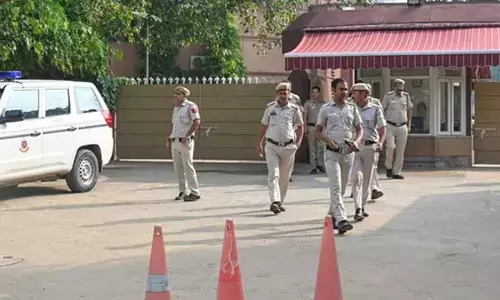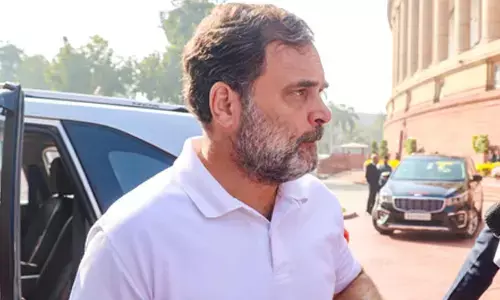Space industry welcomes new FDI norms, expects $25 bn fresh investment in 10 years
Share :

India’s decision to revise its Foreign Direct Investment (FDI) norms for the space sector is expected to bring in fresh foreign investments up to $25 billion over the next decade and result in a wave of collaborations between Indian and foreign companies, said a senior official of the Space Industry Association-India (SIA-India).
Chennai: India’s decision to revise its Foreign Direct Investment (FDI) norms for the space sector is expected to bring in fresh foreign investments up to $25 billion over the next decade and result in a wave of collaborations between Indian and foreign companies, said a senior official of the Space Industry Association-India (SIA-India).
Indian rocket and satellite makers and their lobby bodies have welcomed the amended FDI norms while expecting further liberalisation after some years.
They also said the revised norms announced by the Indian Government late on Wednesday are as per their expectations.
“India's decision to open its doors to foreign investors is expected to attract substantial capital inflows, with estimates indicating potential FDI investments of up to $25 billion over the next decade. This infusion of capital will not only stimulate growth within the domestic space industry but also foster innovation and technological advancements, positioning India as a global hub for space exploration and satellite technology,” Dr. Subba Rao Pavuluri, President, SIA-India and Chairman and Managing Director, Ananth Technologies told IANS.
Pavuluri said that the revised FDI Policy approval for India's space sector comes at a time when the global space industry is experiencing unprecedented growth, with projections estimating its value to reach $558 billion by 2026.
“Currently, India's space industry contributes approximately $7 billion to the national Gross Domestic Product (GDP) and employs over 100,000 skilled professionals across various disciplines. With the implementation of liberalised FDI policies, experts predict a substantial uptick in these figures, with projections suggesting a potential GDP contribution of $50 billion by 2030 and the creation of over 500,000 new jobs in the space sector,” Pavuluri added.
On Wednesday, the Indian Cabinet gave its nod for the much-awaited revised norms for FDI in space sector which has made the industry happy.
“The revised policy is aligned with our expectations. We believe that it will further extend to beyond 49 per cent in future, making it even more liberal,” Pawan Kumar Chandana, Co-Founder and CEO of rocket maker Skyroot Aerospace told IANS.
As per the new norms, the maximum FDI for makers of rockets and associated systems and subsystems under automatic route is 49 per cent and beyond that level it will be under the government route, that is, government’s permission will be needed.
“For the launch vehicles sub-sector, the 49 per cent automatic route raises the question of existing foreign investments exceeding this limit. Will the government exempt them, require restructuring, or mandate post-facto approvals? The upcoming FEMA notification should provide crucial clarity,” Abhishek Dubey Partner at Trilegal told IANS.
Asked about the FDI in Skyroot Aerospace, Chandana said, “New FDI policy is 49 per cent for launch vehicles. We are already below 49 per cent and comply with the policy.”
Be that as it may, in respect of satellite manufacturing, operation, satellite data products, ground segment and user segment, the FDI under the automatic route is capped at 74 per cent and beyond that level it will be under the government route.
Terming the revised policy as great news for the space ecosystem Awais Ahmed, CEO, Syzygy Space Technologies Pvt Ltd, commonly known as Pixxel told IANS, “The new FDI norms will catalyse the entire space industry by enabling a larger and global pool of investment capital as well as strategic capital to come into India.”
“This is much needed to not only scale existing companies to becoming globally competitive but also help more startups get started in the first place. Space has always been a global endeavour while also being a matter of nationalistic pride. This easing of FDI norms will enable the Indian private space ecosystem to start being a serious player in that global endeavour,” he added.
“This historic decision paves the way for unprecedented growth and innovation, fostering a new era of space exploration and commercialisation in India. Dhruva Space is poised to leverage these opportunities to make significant contributions to the global space community and achieve remarkable milestones,” said Sanjay Nekkanti, CEO, Dhruva Space, a satellite company.
For the makers of components, systems/sub-systems for satellites, ground segment and user segment, 100 per cent FDI under automatic route has been allowed now.
The industry lobby body Indian Space Association (ISA) thanked the government for its forward-looking reforms in the space sector.
“After the pioneering initiative to administratively allocate satellite spectrum, the decision to allow a liberal FDI policy for space is yet another significant move forward,” Lt-Gen AK Bhatt (Retd.), Director General, ISA said.
The liberal FDI limits by automatic route for end-to-end satellite manufacturing and operation, components and systems/sub-systems for satellites, satellite data products and ground segment, user segment, launch vehicles, creation of spaceports will boost the confidence of all space industry members, including the biggest global players in the space and satellite domain, Bhatt added.
“Currently, the space sector in India accounts for little over about two per cent of the global space economy and this move will help the country to gain a much larger pie in the global market,” Bhatt added.













